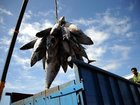Oil exploration and increased sea traffic in the Arctic are encroaching on polar bear habitat, adding to the existing climate change risk, representatives of Arctic nations said at a Moscow conference Wednesday.
"Today we face new challenges with the ship traffic increase and the oil and gas development," Canada's Environment Minister Leona Aglukkaq said at the international forum on polar bear conservation organised by the World Wildlife Fund.
 Full Story
Full Story
The U.N.'s new Green Climate Fund (GCF)opened its headquarters in South Korea on Wednesday, facing the key challenge of funding its mission to support low carbon projects around the world.
The GCF was essentially created as a mechanism for transferring funds from developed to developing nations to help them counter the effects of climate change.
 Full Story
Full Story
From the sky, the 84 glimmering white turbines at Ashegoda wind farm shoot up from the ground like massive spokes, standing out high amid vast expanses of yellow wheat.
Ethiopia's northern Tigray region, mostly populated by cattle farmers who grow the country's staple grains, is an unlikely site for a modern French-run wind farm, let alone sub-Saharan Africa's largest.
 Full Story
Full Story
After two delays, private U.S. company SpaceX on Tuesday successfully launched its first commercial satellite, after repairs were made to the Falcon 9 rocket.
It roared into space at 2241 GMT from Cape Canaveral Air Force Station in Florida, SpaceX said in a statement.
 Full Story
Full Story
Women aren't very good at reading maps, and men are incapable of multi-tasking.
At first glance they might seem like a couple of hoary old stereotypes from the battle of the sexes. But are they?
 Full Story
Full Story
The first full study of a snake's genome has revealed the Burmese python to be one of the most evolutionarily advanced creatures on Earth, international researchers said Monday.
The findings shed new light on how these southeast Asian natives have survived and thrived, and may offer new inroads to treating human diseases, said the report in the Proceedings of the National Academy of Sciences.
 Full Story
Full Story
Scientists have discovered a wonder rice gene that could dramatically increase yields of one of the world's most important food crops, the International Rice Research Institute said Tuesday.
Preliminary tests show that yields of modern long-grain "indica" rice varieties, the world's most widely grown types of rice, can rise by 13-36 percent when infused with the so-called SPIKE gene, the Philippines-based institute said.
 Full Story
Full Story
The future of the world's largest tuna fishery will be decided at a meeting in Australia this week, with Pacific island nations demanding tighter controls on a catch now worth U.S.$7.0 billion a year.
A record 2.65 million tonnes of tuna was hauled from the Pacific last year, accounting for 60 percent of the global catch, with most of the fishing conducted by so-called "distant water" fleets from as far afield as Europe, the United States, China, Korea and Taiwan.
 Full Story
Full Story
China launched its first moon rover mission early Monday, the latest step in an ambitious space program seen as a symbol of its rising global stature.
The Chang'e-3 mission is named for the goddess of the moon in Chinese mythology and the rover vehicle is called Yutu, or Jade Rabbit, after her pet.
 Full Story
Full Story
India's Mars orbiter mission left Earth's sphere of influence early Sunday after performing a maneuver to put it on its way to orbit the red planet.
The spacecraft fired its main engine for more than 20 minutes to reach the correct velocity to leave the Earth's orbit, the Bangalore-based Indian Space Research Organization said.
 Full Story
Full Story



